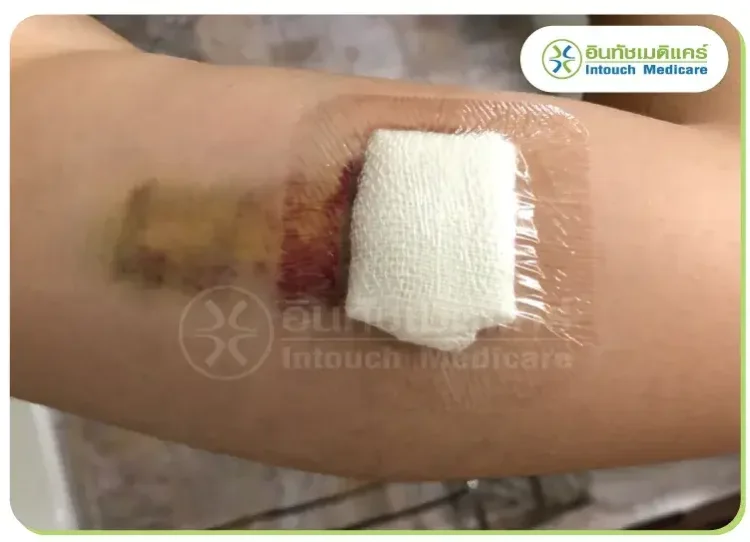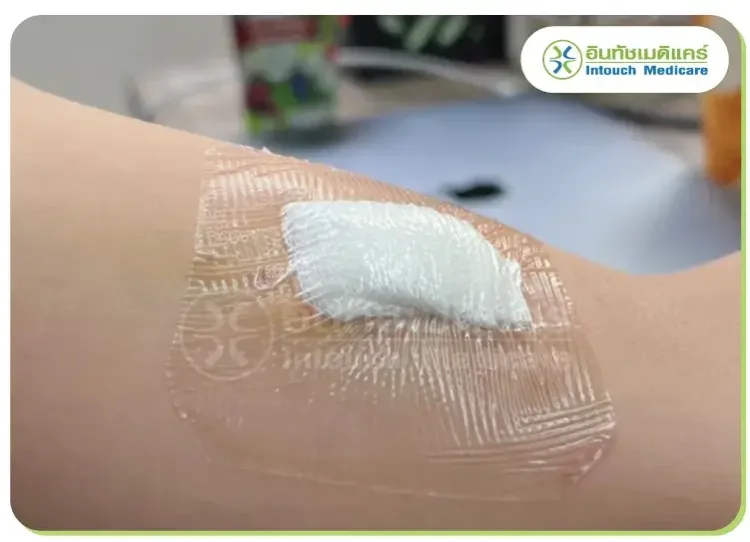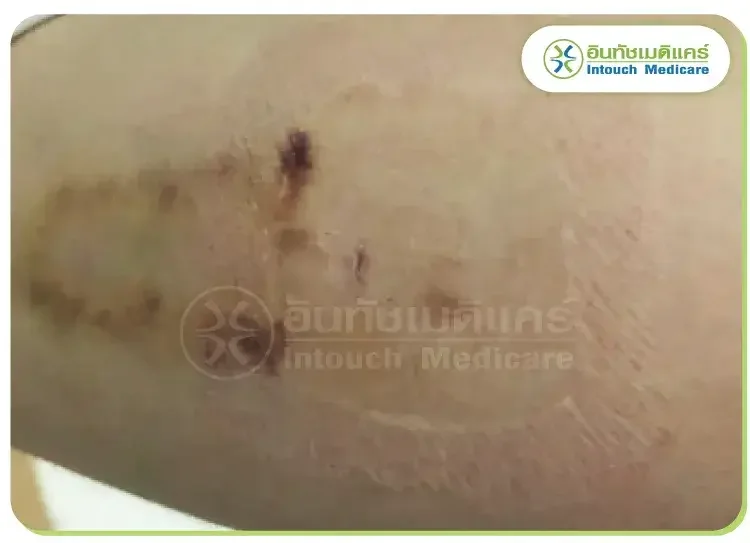Contraceptive Implant and Implant Removal with rasonable price (contraceptive implant)
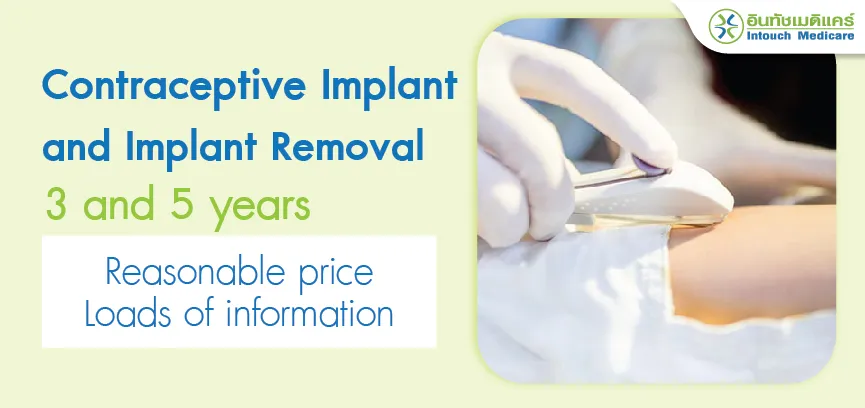
What is Contraception Implant?
Contraception Implant refers to the insertion of contraceptive rods under the skin, typically about 8-10 cm above the elbow crease. The implant is placed under the skin of the non-dominant arm or the less frequently used side. These rods contain either progestogen hormones or levonorgestrel hormones.
It can provide pregnancy prevention for 3 or 5 years depending on the type of medication.
Popular brands for implants include: Implanon, 3 years and Jadelle , 5 years |
Implanting and removing contraception by a skilled physician doesn't take long. It ensures safe birth control that's convenient, quick, and minimally painful. ![]()
In this article, we'll discuss the advantages and disadvantages, Possible side effects of subdermal contraceptive implants, which are small rods inserted under the skin of the upper arm to prevent pregnancy for 3 to 5 years. Once removed, there's no impact on fertility because after discontinuing subdermal implants, the body typically returns to normal hormone levels within one month, reducing the risk of difficulty in conceiving.
Information about Contraception Implant and Implant Removal
How Contraception Implant prevent pregnancy?
Causes the cervical mucus to become thicker or denser than usual, making it much more difficult for sperm to pass through.
If sperm do manage to enter, it can affect the lining of the uterus, making it less conducive for the implantation of a fertilized egg.
Prevents or inhibits ovulation.
Types of Contraception Implant
Types of contraceptive implants can be classified based on the nature of the active ingredient. Type 1 comprises single-hormone formulations, notably Progestogen hormones. One of the prominent medications in this group used for contraception is Etonogestrel, which provides birth control for up to 3 years. Type 2 includes Levonorgestrel hormones, which offer contraceptive protection for up to 5 years.
Currently, contraceptive implants can also be categorized based on the number of rods. The first type consists of a single-rod implant, which provides contraception for 3 years. The second type is a two-rod implant, offering contraceptive protection for 5 years.
Read More About This Topic: What are the two types of birth control implants?
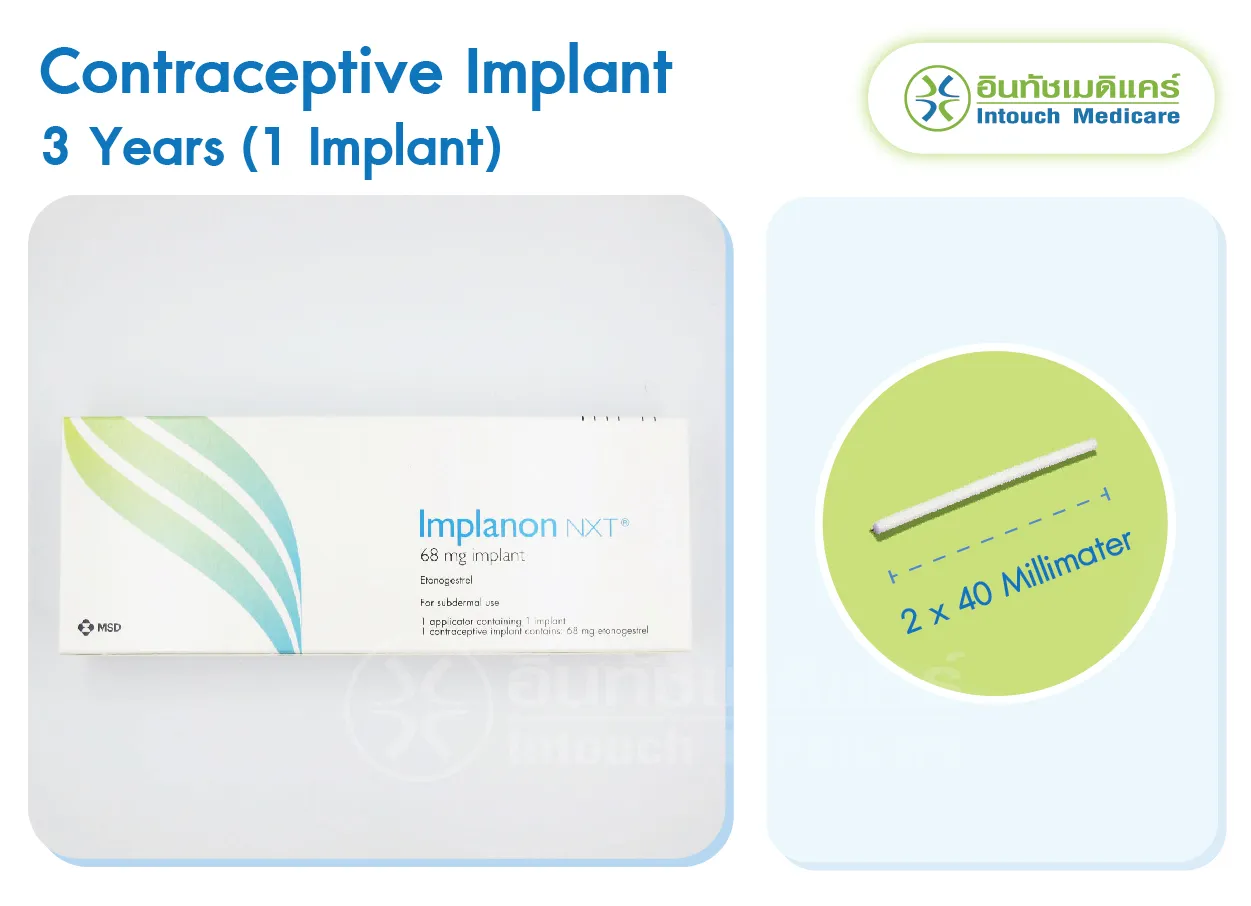
1. Contraceptive implant for 3 years (1 Implant)
The popular brand for the 3-year contraceptive implant is Implanon. It consists of one rod measuring approximately 2 x 40 millimeters. It contains etonogestrel hormone with a size of 68 milligrams. The implant releases hormones at a rate of 60-70 micrograms per day during weeks 5-6.
Towards the end of the first year, the hormone release decreases to approximately 35-45 micrograms per day. By the end of the second year, it further reduces to about 35-45 micrograms per day. Finally, towards the end of the third year, it decreases to 25-30 micrograms per day. This contraceptive implant can effectively prevent pregnancy for up to 3 years.
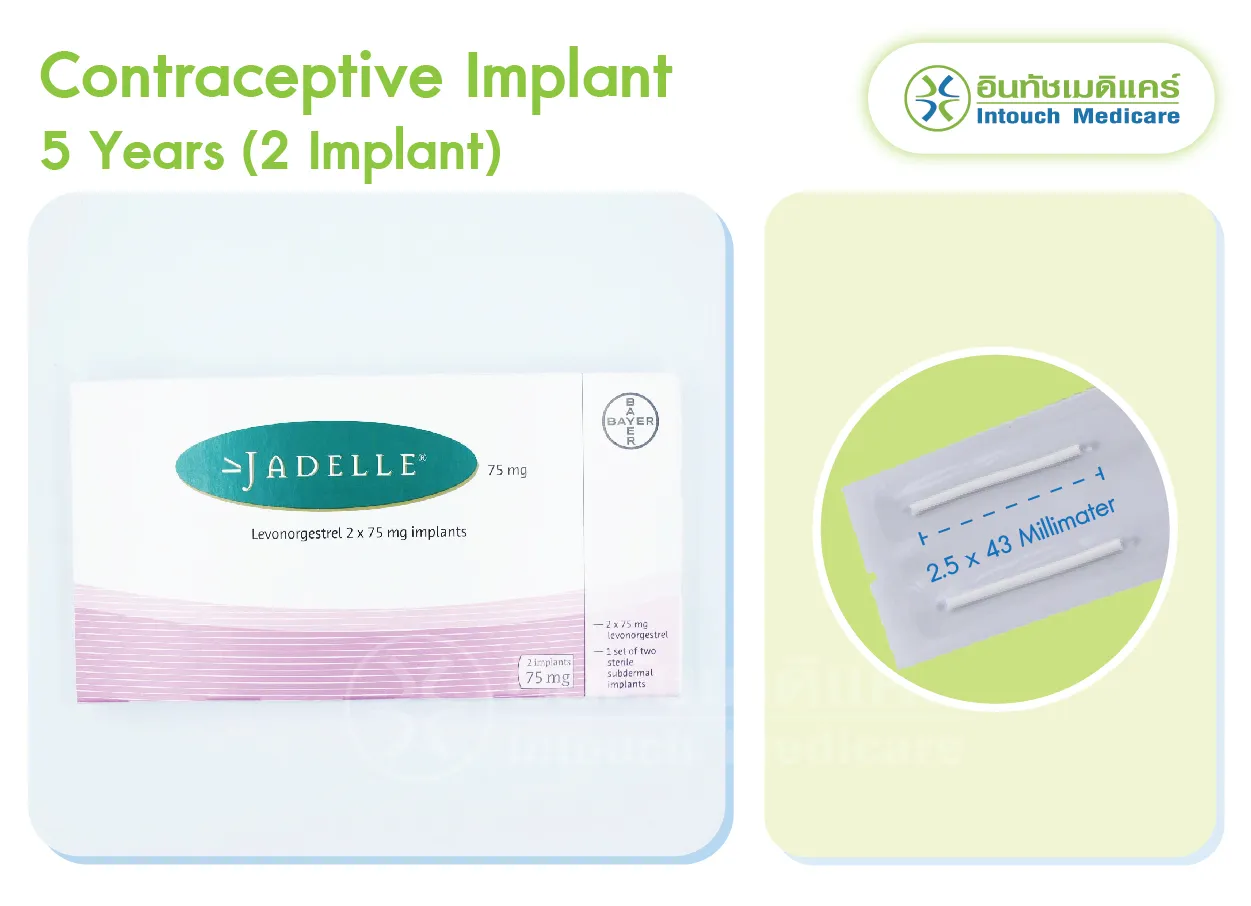
2. Contraceptive implant for 5 years (2 Implant)
Contraceptive implants for 5 years, such as the brand Jadelle, are commonly favored. They consist of two flexible rods, each measuring approximately 2.5 x 43 millimeters. Each rod contains 75 milligrams of levonorgestrel hormone. These implants gradually release levonorgestrel hormone at a rate of 40-100 micrograms per day.
Initially, the hormone release is high and gradually decreases until it stabilizes. It remains effective for up to 5 years. This type of hormone is a key component of several brands of contraceptive pills on the market. Its effectiveness begins as soon as the contraceptive is inserted under the skin.
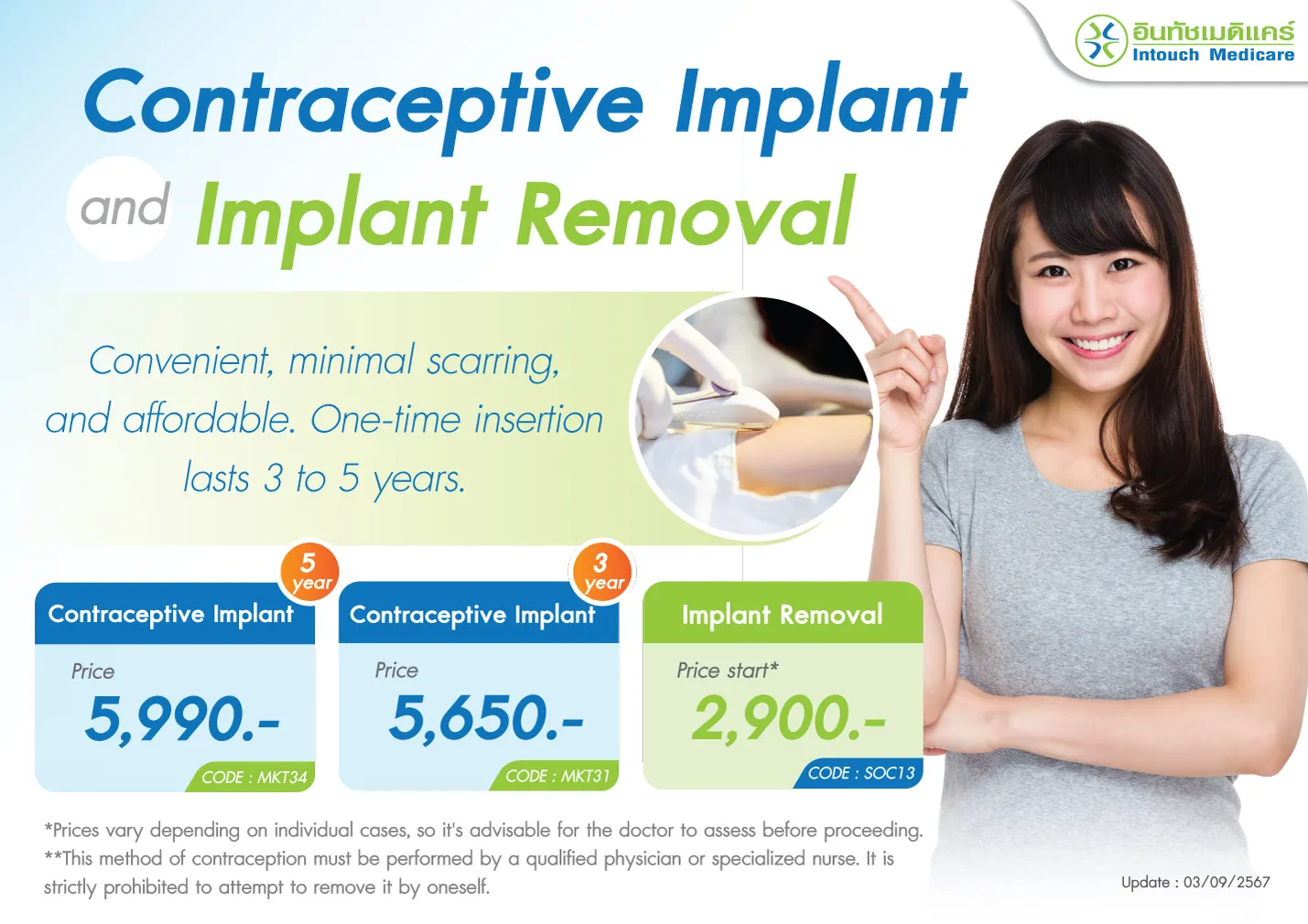
Contraceptive Implant and Implant Removal price
Contraceptive Implant 3 years 1 implant price 5,650 Bath
Contraceptive Implant 5 years 2 implant price 5,990 Bath
Implant Removal price start 2,900 Bath
Note: In cases where menstruation is absent, additional charges may apply for pregnancy testing services.
See additional pricing details: Implant and Implant Removal price
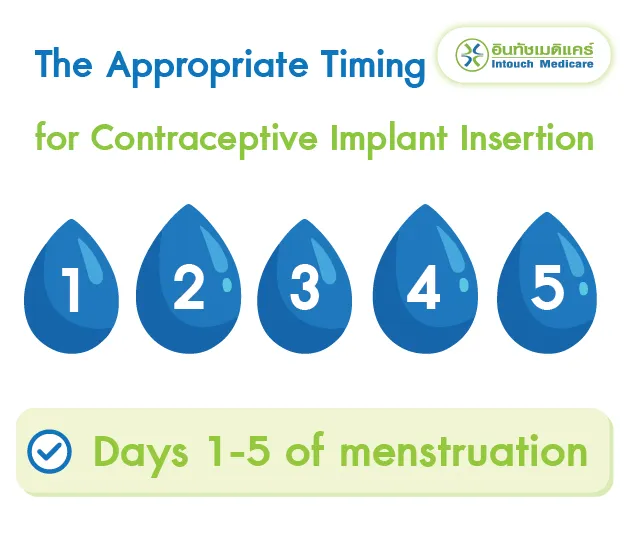
The Appropriate Timing for Contraceptive Implant Insertion
Doctors recommend that the implantation should ideally be done within 1-5 days of menstruation to ensure confidence in avoiding pregnancy. Alternatively, it can be done within 1 week after a miscarriage or 4-6 weeks after childbirth.
If using an external contraceptive implant, aside from the aforementioned time frames, pregnancy testing should be conducted on each occasion
(at the discretion of the physician)![]()
The key to contraceptive implants is ensuring proper and cautious insertion according to the correct procedure. Crucially, the implant should be palpable, as it may be difficult to remove if it is inserted too deeply (i.e., deeper than beneath the skin layer) and cannot be felt upon palpation.
Recommended articles for you
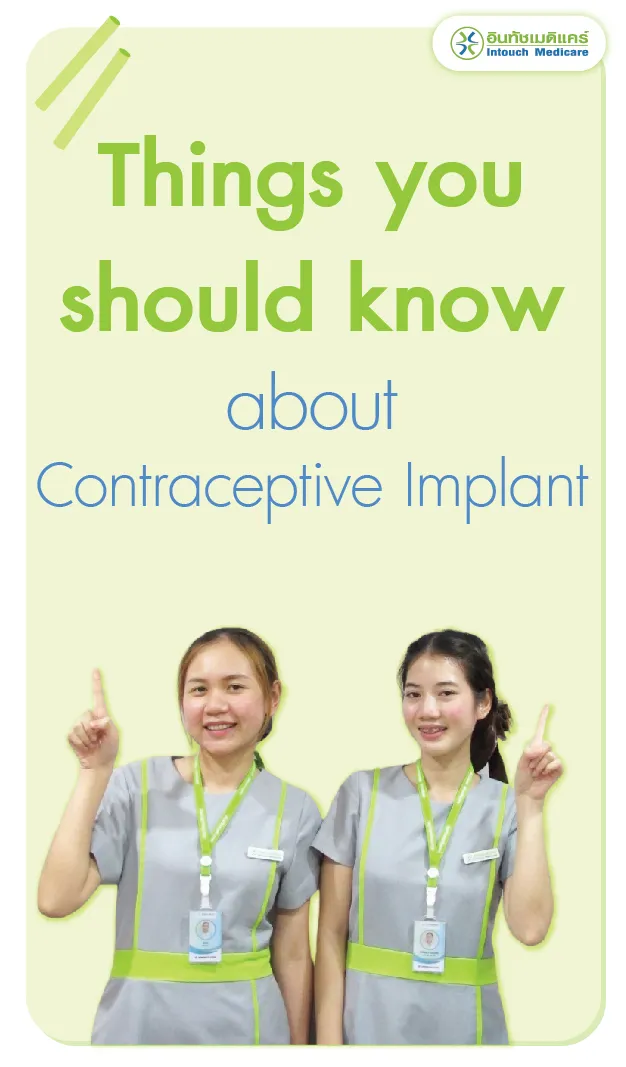
Things you should know about Contraceptive Implant
The effectiveness of contraceptive implants begins immediately after insertion within a period of just 5 days from the start of menstruation. However, in cases where it's not within the menstrual cycle, it takes 7 days for effectiveness to kick in to prevent pregnancy.
Contraceptive implantation should ideally be done at least 3 weeks after childbirth. If it's done within 21 days, it can prevent pregnancy immediately. However, if it's done after 21 days, one might have to wait an additional 7 days for it to become effective.
Diseases that require consultation with a doctor before implantation include: self-allergic diseases or SLE, severe depression (medications used may interact with contraceptive implants), migraines, hypertension, heart disease patients, cerebral vascular disease, diabetes. It may be necessary to consult a doctor before proceeding for safety reasons.
Contraceptive implants are relatively expensive compared to other forms of birth control such as pills or Contraceptive injection. Therefore, it's important to know that some medications may decrease the effectiveness of implants, such as antibiotics like Rifabutin or Rifampicin, anti-seizure medications, and HIV medications.
Contraceptive implants carry minimal risks, with only a 2% chance of infection during the insertion and removal process (considered very low). If infection does occur, it can be easily treated with cleaning and antibiotics.
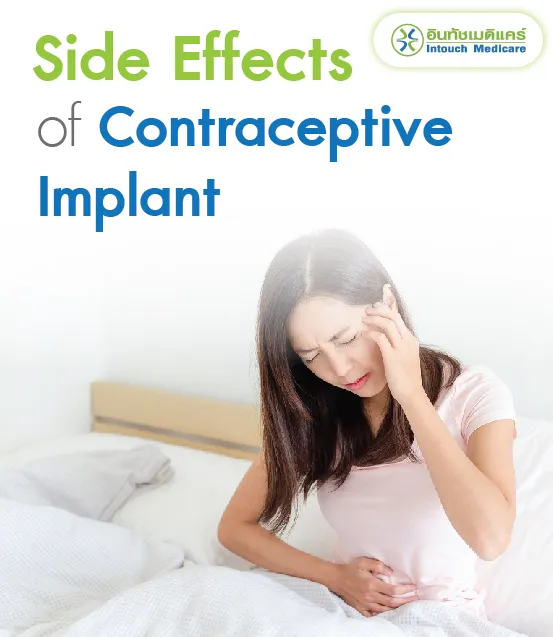
Side Effects of Contraceptive Implant
Menstrual irregularities may occur, with periods being longer than usual, lasting more than 8 days, especially in the first year.
Subsequently, there may be a decrease in blood flow, with periods becoming more regular. Occasionally, there may be prolonged intervals between periods or even an absence of menstruation. Symptoms such as headaches, abdominal pain, and breast tenderness may also occur.
Side effects are not indicative of illness, and the disappearance of menstruation is not a sign of pregnancy.![]()
Usually, most side effects diminish or disappear within the first year. However, if there are concerns about other issues, it is advisable to consult a healthcare provider at the clinic where the service is provided.
Read more about this topic : Are there any health risks associated with contraceptive implant side effects?

After the Contraceptive implant, when can I have sex?
Patients often inquire whether they can engage in sexual intercourse immediately after receiving a contraceptive implant, or when it is safe to do so. Here are our recommendations:
Contraceptive implants begin to take effect immediately, but their contraceptive effectiveness gradually increases over time.
If inserted within the first 7 days of the menstrual cycle, sexual intercourse can be safe immediately, depending on the physician's discretion.
If inserted on subsequent days or any other day of the menstrual cycle, contraceptive protection can be achieved 7 days after insertion.
In the meantime, other contraceptive methods should be used, such as condoms or external ejaculation, for example.
If there are concerns about pregnancy during this time, it is advisable to use condoms or practice withdrawal method in addition.![]()
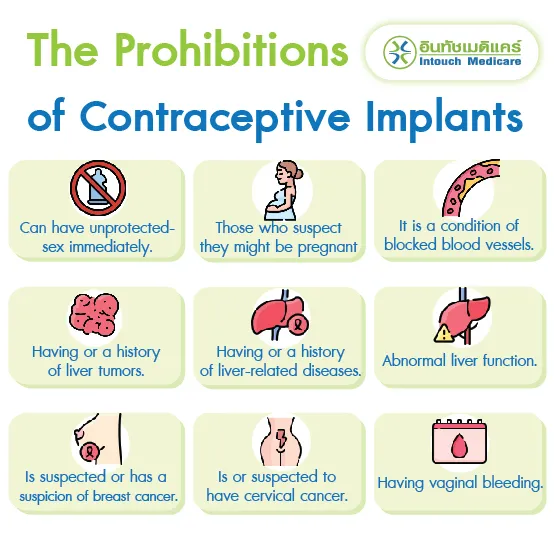
The Prohibitions of Contraceptive Implants
Avoid having unprotected intercourse for at least 7 days after contraceptive implant insertion.
Be aware of or suspect pregnancy.
Have a history of or currently suffer from thrombosis, such as in the legs, lungs, or eyes.
Have or have a history of liver tumors, both cancerous and non-cancerous.
Have or have a history of liver disease.
Abnormal liver function (as indicated by laboratory tests).
Have or suspect breast cancer.
Have or suspect cervical cancer.
Experience unexplained vaginal bleeding.
Removal of Contraceptive Implants (Implant Removal)
Removal of Contraceptive Implants (Implant Removal) is easy and quick, taking only a short amount of time. It can be removed when the scheduled duration expires or when one desires to stop contraception in preparation for pregnancy. Additionally, if one wishes to continue contraception with another contraceptive implant, the rod can be replaced immediately after removal.
FAQ About Contraceptive Implants and Removal
Is it dangerous to exceed the recommended duration of contraceptive implantation?
Does leaving the contraceptive implant in beyond its recommended duration prevent pregnancy?
Does the contraceptive implant have any benefits beyond birth control?
Can I use the arm where the contraceptive implant is inserted normally?
Are there any side effects after removing the contraceptive implant?
Can I have a new implant inserted immediately after removal?
Can I get pregnant after removing the contraceptive implant?
Can I remove the contraceptive implant before or after the scheduled duration?
Does contraceptive implantation affect future fertility?
Contraceptive implants do not make it difficult to conceive. When the contraceptive implant is removed, the body quickly adjusts hormone levels. Ovulation can return to normal within 1-2 months. In fact, within a year, there is a high chance of becoming pregnant immediately. Therefore, mothers concerned about future fertility can rest assured.
Is it dangerous to exceed the recommended duration of contraceptive implantation?
In cases where the contraceptive implant exceeds its recommended duration, it can be encountered, although no harmful side effects are typically observed. However, it is not advisable to leave it in for too long, as it can make removal difficult. Some individuals may require surgical intervention for removal. During this period, it is advisable to use alternative contraceptive methods concurrently, as the effectiveness of the implant diminishes over time. Engaging in unprotected intercourse during this period significantly increases the chances of pregnancy.
Does leaving the contraceptive implant in beyond its recommended duration prevent pregnancy?
The risk of pregnancy may be high or almost negligible as the hormones in the implant have started to diminish in effectiveness.
When can I get the contraceptive implant inserted?
Within the first 5 days of menstruation to ensure that pregnancy has not occurred. In postpartum cases, the contraceptive implant can be inserted within 6 weeks after childbirth. As for miscarriage cases, it can be done immediately or within 2 weeks after the miscarriage.
Does the contraceptive implant have any benefits beyond birth control?
The contraceptive implant may help reduce menstrual pain, decrease menstrual blood flow, and may even help prevent cervical cancer.
Can I use the arm where the contraceptive implant is inserted normally?
Avoid using the arm where the implant is inserted for heavy lifting during the initial period, as it may cause pain, swelling, and bruising in the arm where the medication is administered. This is normal and not harmful. These symptoms typically improve within 3-5 days.
Are there any side effects after removing the contraceptive implant?
There are no side effects or harmful symptoms at all. However, you may feel numbness around the incision area, which is considered normal.
Can I have a new implant inserted immediately after removal?
If you wish to continue contraception, you can have the contraceptive implant reinserted immediately. The doctor will assist in reinserting the contraceptive implant for you, so you don't have to worry about pregnancy concerns.
Can I get pregnant after removing the contraceptive implant?
Once the contraceptive implant is removed, the body will quickly readjust to its normal state within 1-2 months. Most women will resume ovulating within 3 months. After that, the body will return to its original state, and there will be a chance of pregnancy immediately. It is recommended to consult a doctor for appropriate advice on self-care moving forward.
Can I remove the contraceptive implant before or after the scheduled duration?
Removing the contraceptive implant is not dependent on a specific timeframe, whether it's before or after the period designated by the doctor. If you want to remove it to conceive, you can do so immediately without any side effects. Alternatively, if the designated time has passed but you haven't had the opportunity to remove it, you can leave it in place, but it's advisable not to exceed one month. After the designated removal period, the quality of the contraceptive implant diminishes, and it no longer effectively prevents pregnancy.
Read More About This Topic: Top FAQs about Contraceptive Implants![]()

Caring for Yourself After Contraceptive Implant Removal
Avoid using the arm from which the contraceptive implant was removed for heavy lifting.
Avoid contact with water or taking a shower. It's okay if it gets wet as long as you're using a waterproof plaster.
Normally, if there's no pain, you can remove the gauze and waterproof plaster after 5-7 days. However, if there's excessive pain, swelling, or bleeding, it's abnormal, and you should see a doctor promptly.
|
Interesting Articles
Did You Know? What are the Benefits of Contraceptive Implants? Let's Find Out Together!
Precautions Before Implanting Birth Control! What You Should Know Before Implanting Birth Control
Side Effects of Contraceptive Implants! What Are They? Read On!
Post-contraceptive implantation practices: What are the methods?
Compiled by Onuma Peanphon, MD.
Last Update : 24/10/2024


